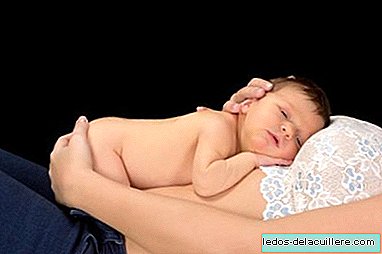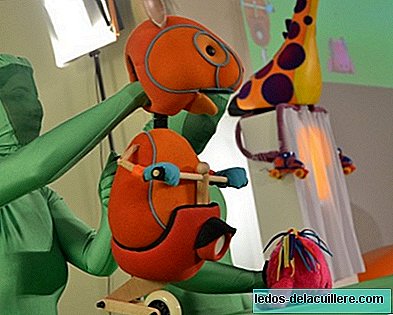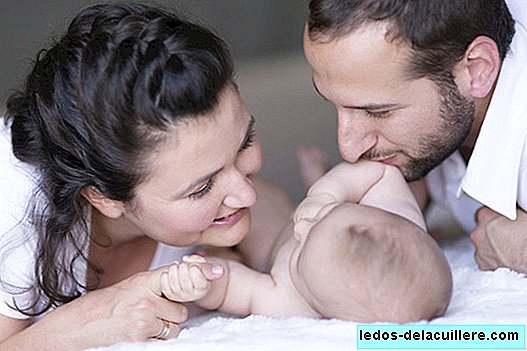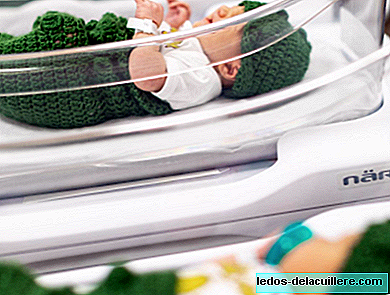
Gestation in humans lasts approximately 38 weeks, 266 days, from conception to birth. The baby is not able to survive on its own outside the mother's womb, it is a helpless being that needs to be provided with basic care such as food, protection and permanent physical contact.
Birth is not a before and after, a separation between mother and baby, but a continuation of that dependence but outside the womb, what is known as extrogestation of the baby or the second nine months of "pregnancy".
Nine months inside the belly, nine months outside
At least during the nine months after delivery, the baby needs to feel the warmth, protection and comfort he felt inside his mother's womb while adapting to extrauterine life.
Surely you can see the image of the kangaroo mother brewing the baby in her bag. Kangaroo pups are born with a very incomplete state of development so they crawl into the marsupium in their mother's womb where they need to spend a lot drinking their milk until they are developed.
Humans are also born underdeveloped and need to continue "gesturing" outside the uterus. But of course, humans do not have marsupium, that bag that works as an incubator, so we have to provide our young with similar care. How? With a lot of physical contact skin with skin and raising in arms, carrying the baby in arms and carrying it as long as possible.
External pregnancy or extrogestation, what is it?

Just by observing a newborn baby we can see that he is unable to survive on his own. You need heat, food and our protection to know out of danger. Nor can he communicate with words, only crying, nor can he move on his own as do other mammals as soon as they are born.
At the time of birth the baby goes through a transformation, passes from life inside the womb to a completely different world. It is a very big change, therefore, this adaptation must be gradual, need to continue feeling inside the womb while being outside.
The proximity to the mother during the first months of life favors in the baby the regulation of the development of its still immature systems at birth.
Forty weeks is a very short time of pregnancy
The 40 weeks of pregnancy, 38 from the moment of conception, are very little gestation time for the human being.
Throughout the history of evolution, pregnancy has been reducing its duration. Due to the increase in the size of the brain and the head, adding to the narrowing of the pelvis, starting the standing, human beings have had to reduce the maturity of their systems in order to cross the birth canal and be able to be born. Human gestation has had to be shortened causing us to be born helpless and immature.
Apes are born just two weeks later than humans, but their level of development is higher. While the human brain has developed 25 percent at birth, that of the ape has doubled. Throughout life, all our stages of development (childhood, puberty, adulthood) are much longer. Therefore, pregnancy should be too.
According to Portman, to reach the state of development of a newborn monkey, the gestation of the human being should be approximately 21 months. Another researcher, Kovacks set it between 18 and 20 months, while according to Bostok the ideal gestation for a newborn human being would be when the quadruped locomotion (four-legged movement) begins, when in theory he would be able to escape danger from his own media. In the human baby this would happen at the beginning of crawling, around nine months, so it is called extrogestation as the second nine months.
The immature baby's brain

The baby is born with a very underdeveloped brain. Other organs such as the heart or lungs have completed their development to allow them to survive outside the uterus, but the brain will just grow and mature out.
At the time of birth, the brain establishes few neural connections and represents only 25 percent of the size it will be in adulthood. In fact, most brain development occurs outside, especially in the first years of life reaching at four years 1,000 billion neural connections, the oldest in his life.
That is why the experiences lived in the first years of life are key to the development of your brain. Although as an adult you will remember very little of those years, everything you live and the care you receive will largely determine your future life.
At least those second nine months of "gestation" after birth they are necessary to minimally complete their development. From that age, between nine months and the year, the baby begins to interact with the world around him, beyond his caregivers.
The beginning to move on its own, crawling and then on its own foot, is the natural evolution of the human being that now does start feeling confident to explore and discover What the world has to offer.
Photos | Thinkstock
In Babies and more | The baby's brain: how to help its correct development (I)












